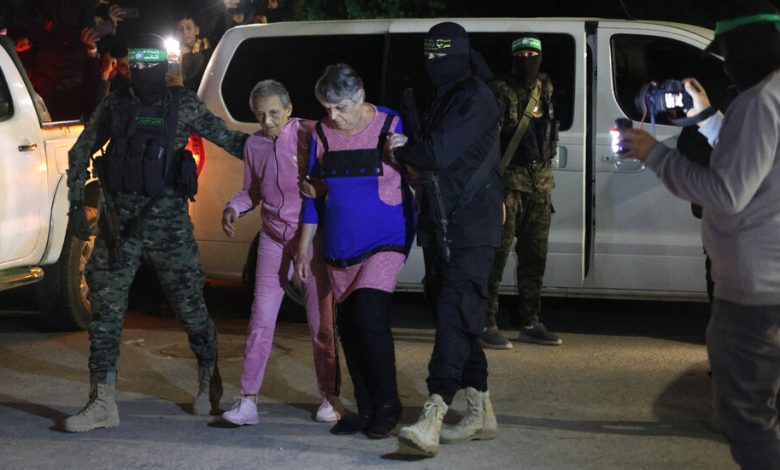Hamas Releases 12 More Hostages as Nations’ Spy Chiefs Go to Qatar for Talks

Israel said on Tuesday it had received 12 more hostages from Gaza amid negotiations for a broader hostage-prisoner deal and warnings from the United States that, should hostilities resume, Israel should fight more surgically and avoid further mass displacement of Palestinians.
The Israeli military said in a statement that 10 Israelis — including three members of the same family — and two Thai nationals were freed. Thirty Palestinian women and minors were released from Israeli prisons on Tuesday as part of the agreement, according to an official list. It was the fifth exchange of hostages and prisoners since Friday.
Since Friday, when a cease-fire deal covering hostages, Palestinian prisoners and aid for Gaza went into effect, Hamas has released more than 60 hostages seized in its Oct. 7 raid in Israel that set off the war. Israel has also freed 180 Palestinians from its prisons, most of them women and minors.
Egypt, Israel and the United States dispatched their top intelligence officials to Qatar to negotiate further exchanges. William J. Burns, the C.I.A. director, joined David Barnea, the head of the Mossad, Israel’s spy service, and Abbas Kamel, Egypt’s spy chief, for meetings with Qatari officials, including the prime minister.
Two people with knowledge of the mediation efforts said the hope was that the current model — a daily cease-fire with the release of Israeli captives from Gaza in exchange for freeing Palestinian prisoners and detainees held in Israel, along with the entry of aid into Gaza — would generate momentum that would prevent the resumption of hostilities and would create the conditions for longer-term discussions.
The mediators expect the process to become more difficult once all the civilian hostages are freed and the negotiations shift to the release of Israeli soldiers. For them, Hamas, which controls the Gaza Strip, is likely to demand either more or higher-profile detainees, the two people said.
Neither of the warring parties is currently willing to discuss a comprehensive cease-fire, but mediators hope that a string of smaller agreements that benefit each side will help create the conditions for broader negotiations.
Lt. Gen. Herzi Halevi, the Israeli military chief of staff, said in a statement on Tuesday that the military was “prepared to continue fighting.”
“We are using the days of the pause as part of the framework to learn, strengthen our readiness and approve future operational plans,” he added, concluding: “Currently, everything is dedicated to fighting. We will not cease until we restore security to the State of Israel.”
Hamas and Israel accused each other on Tuesday of violating the truce, the first time either had made such an allegation since the cease-fire began. The Israeli military said that explosive devices were detonated near its troops in two places in northern Gaza, and that militants in one area had fired on them. Hamas said its fighters had engaged in a “field clash” provoked by Israel, without offering additional details.
But neither side signaled that it was pulling out of the agreement.
The Israeli hostages released on Tuesday included three relatives, according to a list released by the Israeli prime minister’s office: Gabriela Leimberg, 59, Mia Leimberg, 17, and Clara Marman, 63. The other hostages were Israeli women ranging in age from 36 to 84, the list showed.
Relatives of children recently released described their accounts of spending harrowing weeks with their captors in Gaza.
Eitan Yahalomi, 12, told of being beaten by crowds when he was taken to Gaza on Oct. 7, according to a television interview with the boy’s aunt, Deborah Cohen. “Arriving in Gaza, all the civilians — everyone — hit him,” Ms. Cohen told the French news channel BFMTV.
During his seven weeks in captivity, Eitan was forced to watch footage of the Hamas-led raids, in which Israeli officials said 1,200 people were massacred, Ms. Cohen added. He spent part of his captivity alone, she said, and at other times he was held with people he knew.
“Each time a child cried, they threatened them with a weapon,” Ms. Cohen said.
Other Israelis whose relatives were freed in recent days on Tuesday described the deprivation of their captivity and the emotional fragility of their release.
Four family members of Shahar Mor, 52, were kidnapped on Oct. 7; three of them, including Ohad Munder Zichri, 9, have since been released. But the family’s patriarch, Avraham Mundar, 78, has not.
In captivity, Mr. Mor said, his relatives subsisted mainly on pita bread, which became more scarce as the weeks went by.
Emily Hand, who turned 9 in captivity, was now whispering barely audible sentences to her father, Thomas Hand, after her release on Saturday, he recounted to CNN. “She’d been conditioned not to make any noise,” he said.
The negotiations for a broader hostage-prisoner release deal came as the Biden administration issued its strongest warning yet to Israeli officials about the next phase of their military operation. For weeks, the White House has been careful to say it does not dictate how Israel conducts its military operations, but President Biden and senior members of his staff have grown more vocal as the humanitarian crisis has grown.
The United Nations said the fighting had already displaced most of the 2.2 million people in Gaza. More than 13,000 have been killed, according to Gazan officials.
The White House has told Israel that replicating the scale of its bombardment in northern Gaza as it makes an expected push into southern Gaza would produce a crisis beyond the capacity of any humanitarian support network, the officials said on Monday night.
Even as Israel awaited the release of the hostages, Israel’s military confirmed the deaths of three of its soldiers during the Oct. 7 attacks and said Hamas was holding some of their remains. The army identified them as Sgt. Shaked Dahan, 19, of Afula, in northern Israel; Sgt. Kiril Brodski, 19, of Ramat Gan, near Tel Aviv; and Staff Sgt. Tomer Yaakov Ahimas, 20, of Lehavim, in southern Israel.
The army’s chief rabbi determined that the soldiers had been killed during the attacks based on evidence and intelligence reports, according to the Israeli news site ynet.com. Military funerals will be held on Wednesday for Sergeants Ahimas and Brodski, the site reported.
Sigalit Gal, the mother of Sergeant Dahan, said in a Facebook post that she would not start the weeklong Jewish mourning ritual of Shiva until her son’s body was returned. “I fought all my life to take care and raise you with love, excellent education, values, a proper environment,” she wrote. “You were taken from me forever. They took you and did not care to return you — not even your body.”
It was not immediately clear whether the military’s announcement indicated that the return of the soldiers’ bodies would be linked to the release of additional Israeli hostages from Gaza.
Reporting was contributed by Patrick Kingsley, Alan Yuhas, Julian E. Barnes, Erica L. Green and Matthew Mpoke Bigg.




